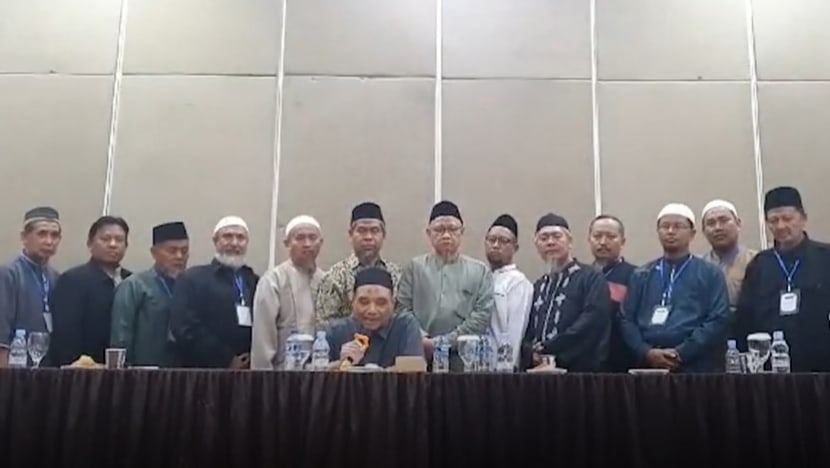Commentary: Jemaah Islamiyah is no more, but the terror threat it poses will persist

Jemaah Islamiyah leaders declared the dissolution of the terror organisation on Jun 30, 2024. (Screengrab: YouTube/Arrahmah)
SINGAPORE: Southeast Asia was shaken to the core by the deadly Bali bombings in 2002. More than 20 years later, Jemaah Islamiyah (JI) - the terrorist group behind the shocking attack - is no more.
On Jun 30, 16 senior JI members announced the dissolution of the Al-Qaeda-linked organisation and that they will return to the fold of the Republic of Indonesia and were ready to abide by its laws. The statement, read aloud by jailed former leader Abu Rusdan, also said that they would ensure that the curriculum and teaching materials in JI-affiliated religious schools will be free from tatharuf (extremism).
This marks a significant milestone in Indonesia’s counterterrorism efforts. But the end of JI as an organisation does not eliminate the threat that it poses.
PERSISTENT THREATS
The first threat lies in the potential formation of splinter groups by other senior leaders and members who might disagree with the dissolution.
Most JI members are likely to follow the call to disband. Not only was the announcement sanctioned by a sizeable number of respected authority figures, JI members recruited in the past decade have been largely disciplined to follow orders as a result of a revamped recruitment process and internal policing system.
However, there are militant factions in JI that might disagree. Indeed, there has been precedence of such factions operating independently.
In 2019, Imaruddin took advantage of the sudden power vacuum following longtime leader Para Wijayanto’s arrest to plan attacks - an act JI has forbidden since 2011. His faction made plans to attack Chinese-Indonesian owned stores in Banten, West Java and East Java, amassed over 260 million rupiah (US$16,060), and procured two firearms before being arrested.
The second threat lies in efforts to infiltrate popular religious organisations and amass support for the formation of an Islamic state in Indonesia.
JI’s preferred strategy in the past decade has shifted from carrying out violence to conducting dakwah (preaching). As early as 2010, some JI scholars stated that “if establishing an Islamic state were the goal, above-ground organisations like the Islamic Defenders Front had made more progress than JI”.
Ultimately, JI recognised that it does not need to lead dakwah initiatives. It has been releasing JI seniors from the organisation’s structure to take on community leadership roles. The most famous example of this is Ahmad Zain-An-Najah, who was part of top clerical body Indonesian Ulema Council when he was arrested for JI links in 2021.
JI could continue dakwah efforts independently to promote JI extremist ideology even as the organisation ceases to operate.
WEAKENED BY COUNTERTERRORISM EFFORTS
That said, the threat should not be exaggerated. If a splinter group does emerge, it will take some time for them to reorganise and recruit new members. Additionally, the mandate of Indonesia’s counterterrorism operations has grown exponentially since 2018.
JI had been significantly weakened over the past five years, with the mass arrest of its members by national police anti-terrorism unit, Detachment 88.
Despite not conducting any successful attacks since 2011, JI members have increasingly become the primary focus of Indonesia’s counterterrorism operations, accounting for over 59 per cent of all terrorist suspects arrested in 2023 up from only 8 per cent in 2019.
It lost top decision-makers in the arrests, including Para Wijayanto in 2019 and the head of its leadership appointment council Arif Siswanto in 2020. Hits to organisational and operational capacity forced JI to halt key divisions. This included the ADIRA division tasked with training, vetting and assigning operational roles to recruits and selecting potential cadres for more advanced training.
In its weakened leaderless state, JI had been reallocating its resources and adapting its structures to prime itself for a future resurgence.
It reassigned members to its tholiah (all-purpose) unit to assist senior members fleeing arrest. It decentralised operations to regional commands and prevent cross-region snowballing of arrests.
Discussions to disband the organisation between the police and several JI seniors started as early as 2022. Fearing that Detachment 88’s expanded “preventive strike” capabilities would result in not only further arrests, but also the seizing of JI schools and assets, these senior members agreed to dissolve the group.
PREVAILING SECURITY THREAT IN SOUTHEAST ASIA
While JI’s dissolution should be celebrated, it is still important to monitor its impact and ensure it stays dissolved - not just fly under the radar and rebuild once more.
Indonesia needs to adopt a balanced approach. On the one hand, the Indonesian security apparatus should cooperate in good faith with former JI members and assist their reintegration into society; otherwise, JI members might see no reason to cease their activities.
On the other hand, it is also important for relevant stakeholders to remain vigilant and ensure rogue factions do not attempt to continue covert operations under the guise of a reformed organisation.
For now, the wider security landscape in Southeast Asia remains unchanged.
While JI’s members and influence will continue to be a concern the region should monitor, Southeast Asia’s current primary threat still comes from pro-Islamic State groups. As shown in the recent attack on a police station in Ulu Tiram, Malaysia that resulted in the deaths of two officers, Islamic State ideology still aims to and is capable of inspiring violence.
Alif Satria is an Associate Research Fellow in the International Centre for Political Violence and Terrorism Research (ICPVTR), S Rajaratnam School of International Studies, Nanyang Technological University.


No comments
Share your thoughts! Tell us your name and class for a gift (: